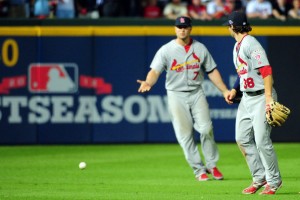World Series Umpire Strikezone Scores Game 1 and 2 3
When you evaluate the home plate umpires for the World Series after two games, clearly Dan Iassogna called a better game than Gerry Davis did.
Overall the Umpire Strikezone Scores on Close Calls, Iassogna had .923 and Davis had .838 correct.
When you look at the split between left and right handed batters Davis was not very consistent.
On left handed batters Gerry Davis had 33 pitches within six inches of the plate where he had to make a call.
He called seven pitches strikes that were off the plate, and two pitches balls that were really strikes. Nine wrong calls out of 33 game him a USS.727.
On RHH Davis missed only four pitches total for a USS of .915.
If Davis ever looked at these numbers and graphics he would see that he always calls a pitch that is really outside a strike, but he only does this with left handed batters.
Home plate is 17 inches across for both right and left handed batters.
Why do many umpires continue to make the plate wider for left handed hitters than they do for right handed hitters?
Iassogna is in the lead for the best ball and strike umpire of the 2012 World Series. His .923 total is going to be the number to beat.
What do you think the umpires would do if these graphics were shown in every park while each game was being played?
Do you think they would learn to call that outside pitch to left handed hitters a ball, if everyone saw how they missed it so many times?
Gerry Davis 2012 World Series Game 1
USS total .838. 80 close call pitches 13 incorrect calls
LHH USS .727 33 close call pitches: seven balls called strikes, two strikes called balls
RHH USS .915 47 close call pitches four balls called strikes, zero strikes called balls
Dan Iassogna Game 2 2012 World Series.
USS total .923 91 close called pitches seven incorrect calls
LHH USS .857 28 close call pitches: three balls called strikes, one strike called a ball
RHH USS .952 63 close call pitches: one ball called a strike, two strikes called balls






